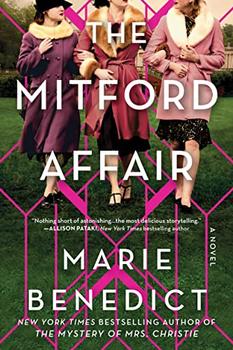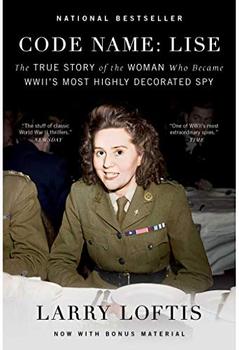Summary | Excerpt | Reading Guide | Discuss | Reviews | Beyond the book | Read-Alikes | Genres & Themes | Author Bio

A Novel
by Marie BenedictFrom New York Times bestselling author Marie Benedict comes an explosive novel of history's most notorious sisters, one of whom will have to choose: her country or her family?
Between the World Wars, the six Mitford sisters―each more beautiful, brilliant, and eccentric than the next―dominate the English political, literary, and social scenes. Though they've weathered scandals before, the family falls into disarray when Diana divorces her wealthy husband to marry a fascist leader and Unity follows her sister's lead all the way to Munich, inciting rumors that she's become Hitler's mistress.
As the Nazis rise in power, novelist Nancy Mitford grows suspicious of her sisters' constant visits to Germany and the high-ranking fascist company they keep. When she overhears alarming conversations and uncovers disquieting documents, Nancy must make excruciating choices as Great Britain goes to war with Germany.
Probing the torrid political climate in the lead-up to World War II and the ways that seemingly sensible people can be sucked into radical action, The Mitford Affair follows Nancy's valiant efforts to stop the Nazis from taking over Great Britain, and the complicated choices she must make between the personal and the political.
Marie Benedict demonstrates the pre-war time period's complexity remarkably well. We tend to think of Allied countries as uniformly anti-fascist, but the author really brings home the fact that the political landscape was nowhere near that simple. In clear prose that rotates among the three Mitford sisters' points of view, she brings this multi-faceted era to life. It's a fascinating slice of history...continued
Full Review
(595 words)
This review is available to non-members for a limited time. For full access,
become a member today.
(Reviewed by Kim Kovacs).
In Marie Benedict's historical novel The Mitford Affair, much of the narrative focuses on the rise of fascism in Great Britain before World War II.
Merriam-Webster defines fascism as "a political philosophy, movement, or regime…that exalts nation and often race above the individual and that stands for a centralized autocratic government headed by a dictatorial leader, severe economic and social regimentation, and forcible suppression of opposition." Today, in the context of WWII, most think primarily of fascism in Hitler's Germany or Mussolini's Italy, but in fact the movement had its advocates in other countries as well, including the United Kingdom and the United States.
The years after World War I saw ...
This "beyond the book" feature is available to non-members for a limited time. Join today for full access.

If you liked The Mitford Affair, try these:

by Kristin Harmel
Published 2021
Inspired by an astonishing true story from World War II, a young woman with a talent for forgery helps hundreds of Jewish children flee the Nazis in this unforgettable historical novel from the New York Times bestselling author of the "epic and heart-wrenching World War II tale" (Alyson Noel, #1 New York Times bestselling author) The Winemaker's ...

by Larry Loftis
Published 2019
The extraordinary true story of Odette Sansom, the British spy who operated in occupied France and fell in love with her commanding officer during World War II - perfect for fans of Unbroken, The Nightingale and Code Girls.



Every good journalist has a novel in him - which is an excellent place for it.
Click Here to find out who said this, as well as discovering other famous literary quotes!